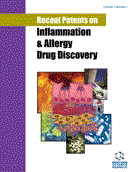Abstract
Background: Inflammation is a protective response of the body system that protects the body from the various kinds of external and internal insults; however, it has been found that most chronic illnesses are caused by dysregulated and excessive inflammation. Inflammation plays a major role in developing neurological diseases. In the brain cytokines, TNF-α and TNF-β are known to mediate inflammation in many diseases. Functions of these cytokines are regulated by the activation of transcription factor NF-κb. Recent evidence suggest that curcumin has an immense therapeutic potential because of its anti-inflammatory and anti-oxidant properties. It has been tested for treating various chronic illnesses associated with the brain.
Objective: The study aims to elucidate the role of curcumin in alleviating the inflammatory reactions initiated by TNF-α and NF-κb signaling.
Methods: This study is a survey of literature from sources like PubMed central, science direct, medline and available scientific databases to determine how inflammation plays an important role in the development of neurodegenerative diseases and the role of curcumin as an anti-inflammatory agent. Looking into the importance of curcumin in alleviating inflammatory responses, several patents are filed and accepted which are referenced in this article.
Results: Neuro-inflammation mediated by TNF-α plays a major role in the development of pathologies like Alzheimer’s disease, Parkinson’s disease, multiple sclerosis, amyotrophic lateral sclerosis etc. Curcumin appears to subside or reduce the inflammatory responses. Thus, it appears to have therapeutic potential for treating various neuroinflammatory diseases.
Conclusion: Cytokines get upregulated during neurodegenerative diseases as a result of which inflammatory responses are initiated in the brain. Curcumin is reported to have anti-inflammatory properties and thereby its supplementation may help in reducing the inflammation. Future research on this area will further explain the mode of action of curcumin in alleviating neuroinflammation.
Keywords: Alzheimer's disease, amyotrophic lateral sclerosis, curcumin, cytokines, glutamate inflammation, multiple sclerosis, Parkinson’s disease, TNF-α.
 60
60 12
12 1
1 1
1


















